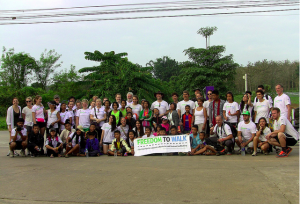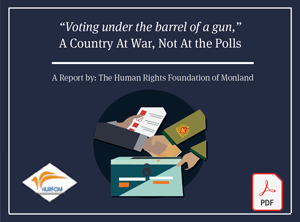“Freedom to Walk” supports global anti-human trafficking movements
November 20, 2012
HURFOM: More than 70 participants joined the final day of a 370-kilometer walk from Bangkok to the Burma border at Three Pagodas Pass on Saturday to support efforts to end human trafficking worldwide. The “Freedom to Walk” campaign raised money for five organizations that work to combat trafficking of men, women, and children across multiple industries in Asia, Africa, North America, South America, and Europe.
 A group of 15 people from 12 countries made the entire 15-day trek, but was often joined by local community members and other anti-trafficking activists. Participants covered between 20 and 28 kilometers per day across Nonthaburi, Nakhon Pathom, and Kanchanaburi provinces, and were able to surpass their fundraising goal by collecting nearly US $120,000 in contributions.
A group of 15 people from 12 countries made the entire 15-day trek, but was often joined by local community members and other anti-trafficking activists. Participants covered between 20 and 28 kilometers per day across Nonthaburi, Nakhon Pathom, and Kanchanaburi provinces, and were able to surpass their fundraising goal by collecting nearly US $120,000 in contributions.
“Freedom to Walk” was founded by two recent university graduates, Ali Weiner from Yale University in the U.S. and Tanrak “Tanny” Chiengtong of Chulalongkorn University in Thailand. The two young women grew up across the globe from each other but said they share a vision for a world where human rights are respected.
According to Chiengtong, “The Walk has three objectives. The first is to raise [U.S.] $100,000 for our five organizations, which are doing wonderful work combating human trafficking. The second is to educate our walkers and raise awareness. Every day, we have small discussion groups and we come up with practical solutions where each individual can take action to combat human trafficking. The third [objective] is to have a corps of walkers who are interested and understand what human trafficking is. We talked with people around the world, including human trafficking victims, who shared their experiences and knowledge with us.”
The co-founders explained that human trafficking can be an uncomfortable subject for people who do not understand the issue, and said they faced some challenges when discussing the concept for the walk during the operational planning stage. However, the group reported receiving positive responses and support from local people as they made their way across western Thailand.
Co-founder Weiner said, “We have two reasons to walk from Bangkok to Burma. First, it is a beautiful walk, and it is really lovely to walk across Thailand. The second is that when we started to develop the idea, [we realized that] Burmese people, especially stateless Burmese people, are the most vulnerable people in Thailand to human trafficking. Because they do not have citizenship in [Thailand], they may get overlooked. So we want to make sure this [event] symbolizes them. The walk is to shine a light on their situation.”
Weiner added that about an hour was spent every night discussing different aspects of trafficking, including the role for businesses in eradicating slavery in their supply chains, forced labor in the mining industry related to cell phone manufacturing, domestic work, stateless people in Thailand, and compensation for trafficked people in Europe. The group also interviewed investigative journalist Ben Skinner who authored the book, “A Crime So Monstrous: Face to Face with Modern Day Slavery,” and staff members at the International Organization for Migration in Ghana working to combat child trafficking in the local fishing industry.
Anita, a participant from the U.S. that completed the entire walk, said, “I joined [the walk] because it’s a cause that I’ve always supported. There are different stages in your life when you can do different things, and I felt for a long time that all I could do was sign legislation [petitions] or maybe send a donation to support a child. I was [attracted to] the component of walking and doing, plus having the ability to speak with like-minded people every day for almost three weeks. For me, that was the hook because I felt like it wasn’t just going to a dinner party one night or a benefit about human trafficking. I wanted an experience where you could really, fully immerse yourself and then go back to your own community and see what you can start. Whether it’s something as simple as educating ourselves further, creating an NGO, or starting our own walk, we all take away something and move forward and try to get the word out…Every journey begins with a single step.”
Comments
Got something to say?
You must be logged in to post a comment.




















































